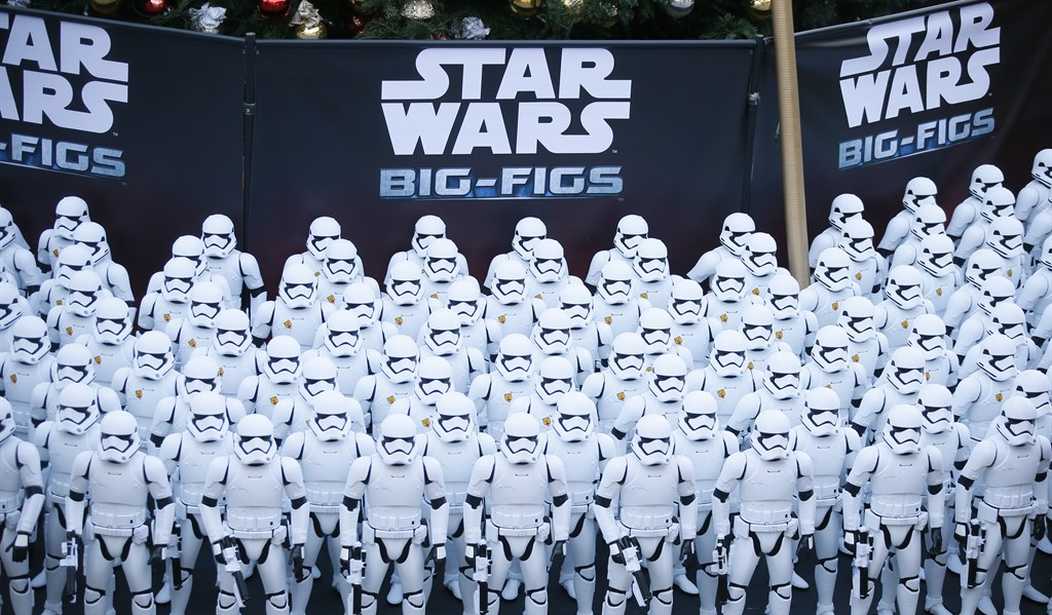America is obsessed with Star Wars. I’m not making a value judgment, just a statement of fact. It’s everywhere, even in car commercials on radio. What the movie franchise has to do with cars is a mystery, but it’s probably working because why else would they do it?
It certainly worked on me. I watched “The Force Awakens” Thursday at 11 p.m., Friday at 9:40 a.m. and Saturday at 7 a.m. Like I said, it’s not a value judgment because I’d be judging myself.
No value judgment is being made, but there are judgments to be made in regards to Star Wars. Plenty, in fact. Not only in the quality of the films, but the message.
What makes Star Wars so appealing is it hits on such universal themes of right and wrong, good and evil, that it can be anything to whoever is watching it.
Kids simply see good vs. evil, the bad guys and the good guys. It’s a basic and pure view of the world. Add in some spaceship chases and laser fights, and they’re hooked. For those of us who fell in love with the movies as kids, this is what hooked us.
On first glance it is not exactly deep, but it can get there. No matter how deep you delve into that galaxy far, far away, this is the door you most likely walked through first to get there.
Examining the politics of Star Wars is a dangerous path that can lead only to the Dark Side. But, like most everything in life, if you’re looking for affirmation of existing beliefs in anything, particularly art, you’ll find it somewhere.
The creator of the Star Wars universe is George Lucas, and George Lucas is a rabid liberal. So if you’re looking at the politics of Star Wars, you know how they were at least intended to be. That doesn’t mean conservatives can’t find themselves as the good guys.
Recommended
First, the liberals.
The “evil empire” is, obviously, evil. And everyone knows conservatives are evil. That’s just good science.
In episode 3, “Revenge of the Sith,” Lucas lays his take bare. As the Old Republic crumbles and the Empire rises, Darth Vader tells Obi-Wan “If you’re not with me, then you’re my enemy.”
The only way Lucas could’ve been more “on the nose” in exposing his politics is if he’d cut to President George W. Bush saying, “Either you’re with us, or you are with the terrorists.”
The intent of movies is one thing, but art is in the eye of the beholder, not the artist.
When I watch the movies as a conservative, I see a dysfunctional, feckless central government unable to address the most basic problems. In “The Phantom Menace,” universally panned as the worst in the series, the Senate is unable to make a move without the formation of a committee to study whether one member planet had invaded another.
Both governments, the Old Republic and the Empire, were the real problem. The Old Republic had become so bloated it even taxed trade routes, because bloated government always needs “more.”
The Empire at least decentralized government some, restoring a modicum of local control. In episode 4, “A New Hope,” Grand Moff Tarkin announced the bloated Senate had been dissolved, “The regional governors now have direct control over their territories.”
Although not ideal, considering he went on to say fear of the Death Star would keep everyone in line, it was an acknowledgement of the problems of centralized power, even in a dictatorship.
But the Empire could not have come into being, a dictatorship could not have seized control, had it not been for the big government bloat. Emperor Palpatine was voted into power and granted exceptional powers, something that couldn’t have come to pass were it not for a government big enough and powerful enough to make it happen in the first place.
Neither government was ideal, and both were tyrannical in their own way. The Old Republic had the Jedi, a group of supernatural enforcers able to use their powers for the Force to impose their will on others. The Empire had Darth Vader and a string of space stations capable of destroying planets.
Both spent lavishly. The Old Republic maintained a capital city of extravagance with opulent events and feasts as residents of member planets lived modest lives.
The Empire spent unimaginable fortunes building two Death Stars, one larger than the other, in such quick succession that they had to have been built simultaneously, with a devastating effect on the economy.
Without giving any spoilers away, in “The Force Awakens” this economic recklessness is embraced yet again by “The New Order,” the latest incarnation of big government crushing the liberty of the galaxy’s inhabitants.
The real lesson of the Star Wars movies is big government leads to a loss of freedom, whether the government was voted for by the people or seized power through manipulation.
It’s the natural order: Government grows and eventually consumes everything.
Thankfully, for the residents of that world, there are always a group of rugged individualists who, wishing nothing more than to be left alone by their government, rise and fight back. And, eventually, win.
You see where I’m going with this, so there’s no reason to state the obvious. But it’s not really obvious to our liberal friends, who see just the opposite. And people who are too busy living their lives to read political meaning into adventure movies, or simply don’t care, see only a fun story and an escape for two hours.
That’s the beauty of Star Wars; it’s whatever you want it to be. And at this point in time – with terrorism spreading, the economy floundering, the election raging and a feckless president acting well beyond his Constitutionally limited powers – we can use all the fun distractions we can get.
























Join the conversation as a VIP Member